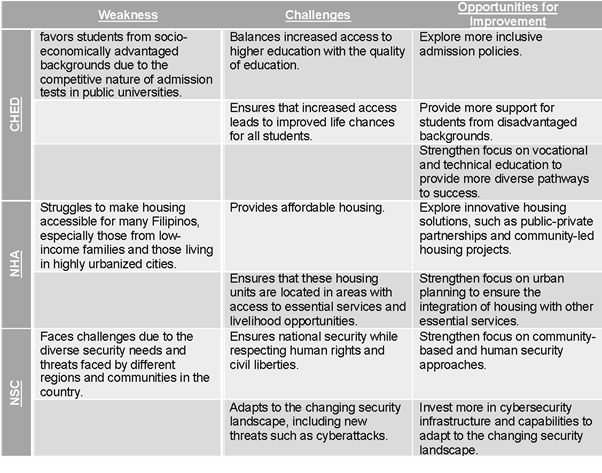
Comparative Public Governance and Addressing Social Inequalities: A Multi-Case Study of Government Higher Education, Public Housing, and National Security Initiatives in the Philippines
Article by Franclin Acal OLIVA, MMPA (Mr)
Abstract:This paper examined persistent social inequalities in the Philippines through a multi-case study of government initiatives in higher education, housing, and national security. Utilizing a modified change management model (otherwise referred to as the Oliva Model of change management for enhancing transformative governance), systemic challenges and agency capacities were evaluated. Data sources included policy documents, reports, interviews, and news articles. The study identified structural economic issues affecting all sectors and highlighted weaknesses in service delivery alongside opportunities for inclusive policies. Assessing flagship initiatives of CHED, NHA, and NSC revealed varying effectiveness levels. CHED demonstrated moderate effectiveness in higher education access, NHA excelled in housing affordability, and NSC exhibited moderate effectiveness in national security strategies. The analysis underscored the complexities of public governance and advocated for continuous monitoring and evaluation to inform future policy-making and organizational procedures, contributing to more effective strategies for addressing social inequalities.
Keywords: social inequalities, transformative governance, public management, change management, inclusive policies, service delivery, social justice
Header Image: Philippines Girl by Moyerphotos is licensed under a CC BY 2.0
Introduction
The Philippines faces persistent social inequalities despite various government initiatives. These disparities cut across critical sectors such as higher education, public housing, and national security, manifesting in various forms, including unequal access to quality education, affordable housing, and a secure living environment.
Initiatives undertaken by the Commission on Higher Education (CHED), National Housing Authority (NHA), and National Security Council (NSC) to address social inequalities were explored, providing a multi-case study that highlights the challenges, the development and implementation of inclusive policies, and the measurable impact on fostering a more equitable organizational environment. By examining these institutions, insights into how public governance can effectively address social inequalities were developed.
Initiatives undertaken by the Commission on Higher Education (CHED), National Housing Authority (NHA), and National Security Council (NSC)[1] to address social inequalities were explored, providing a multi-case study that highlights the challenges, the development and implementation of inclusive policies, and the measurable impact on fostering a more equitable organizational environment. By examining these institutions, insights into how public governance can effectively address social inequalities were developed.
There is a need to evaluate the effectiveness of government actions in higher education, housing, and national security in addressing these inequalities. Despite the concerted efforts of key government institutions like CHED, NHA, and NSC, social inequalities remain entrenched in the Philippines. These inequalities, which emerge as discrepancies in accessing quality education, affordable housing, and a safe environment, are interconnected and mutually reinforcing (Bustamante, 2017; Chao, 2022).
For instance, limited access to quality education may lead to reduced income levels, affecting housing affordability and adherence to legal regulations. Conversely, an unstable environment can impede access to education and stable housing. Moreover, inadequate housing conditions not only disrupt a student’s ability to focus on education, hindering academic performance and perpetuating inequality but also contribute to social instability and crime rates, compromising national security efforts.
This complex interplay of factors presents a significant challenge to public governance in effectively addressing social inequalities. The problem lies in understanding these intersections and developing integrated and holistic policies and initiatives that can effectively address social inequalities across these sectors. Thus, this paper analyzed the initiatives of CHED, NHA, and NSC using a multi-case study approach:
- Inequality in Higher Education Access and Quality: Despite CHED’s efforts to promote accessible, relevant, and quality education, disparities in higher education access and quality persist in the Philippines. This educational inequality contributes to broader social inequalities, limiting socio-economic mobility for disadvantaged groups (Chao, 2022).[2]
- Housing Affordability and Accessibility: The NHA faces significant challenges in providing affordable housing to low-income Filipinos. The persistent housing shortage and rising housing costs have made it increasingly difficult for low-income families to secure decent housing, exacerbating social inequalities and hindering the country’s progress toward inclusive growth.[3]
- National Security and Social Inequalities: The NSC’s role in ensuring national security is complicated by social inequalities. Regions with high poverty and inequality levels are more susceptible to conflict and instability. Addressing social inequalities is, therefore, critical for ensuring sustainable national security.[4]
The study used and developed a modified change management model as a theoretical framework to analyze systemic issues and agency capacity.
Methods
The study employs a multi-case study methodology rooted in the principles of social justice, equity, and transformativeness. A systematic review of relevant news articles identified the flagship initiatives of CHED, NHA, and NSC, providing a broader context for understanding public sentiment and societal impact. These initiatives serve as the focal cases for the study. Each case is examined for its adherence to these principles, which form a normative basis for evaluating the policies and initiatives of CHED, NHA, and NSC, and assessing their impact on social inequalities (UNESCWA, 2020).
The research strategy involves collecting and analyzing various data sources, including policy documents, reports, stakeholder interviews, and news articles. Said initiatives serve as the cases for this study.
The study employed a modified change management model, otherwise referred to as the Oliva Model of Change Management for Enhancing Transformative Governance. This model follows a cyclical process that starts with the awareness and analysis of societal inequality issues. Influenced by both local and global contexts and trends, these issues require transformation through governance, ultimately aiming for continuous improvement. This framework is illustrated by Figure 1.

Figure 1. Theoretical Framework – Oliva Model of change management for enhancing transformative governance
Building on this theoretical foundation, the conceptual framework of this study recognizes that socio-economic disparities significantly impact the effectiveness of initiatives by key institutions like CHED, NHA, and NSC. These disparities manifest as unequal access to resources and opportunities, particularly for individuals from lower socio-economic backgrounds. A said framework is a result of the root-cause analysis of said disparities impacting the initiatives of the three institutions, as illustrated by Figure 2.
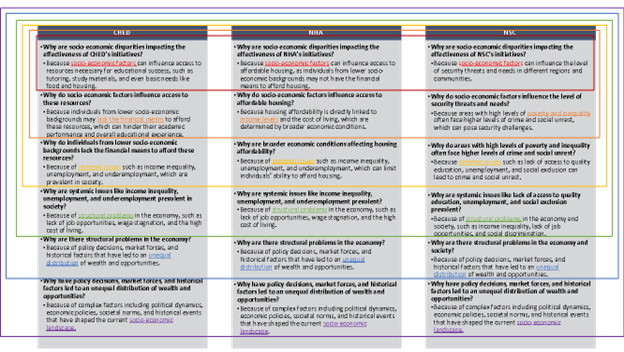
Figure 2. Conceptual Framework from Root-Cause Analysis of Disparities
The framework acknowledges systemic issues such as income inequality, unemployment, and underemployment across all sectors—education, housing, and national security. These issues limit the ability of individuals to access services such as quality education, decent housing, and secure environments.
Aligned with the philosophies of transformative governance and addressing social inequalities, the study reviews the agency’s capacity to foster access, equity, and transformation. A comparative analysis was conducted guided by said frameworks to discern the strengths and weaknesses of each institution’s approaches, comparing strategies and outcomes, and identifying best practices and lessons learned. [5]
The study also devised a systematic analysis to assess how agency initiatives tackle social inequalities in accordance with the principles of transformative governance. These initiatives, as documented in articles and press releases, are scored based on said principles as the normative criteria. Access measures the initiative’s ability to extend services or opportunities to a broader population, equity evaluates fairness and barrier elimination (Lee, 2021), and transformativeness assesses the potential for significant, lasting change. Each criterion is rated on a scale of “0 to 2”, with “2” indicating exceeding expectations, “1” indicating meeting expectations to some extent, and “0” indicating not meeting expectations. The scores are then calculated by totaling and averaging the ratings for each initiative. Finally, the scores for each criterion across all initiatives within an agency are aggregated and averaged to determine the agency’s overall performance against the three criteria.
Result
The thematic analysis found key weaknesses in the delivery of services including issues in admission tests, inaccessible housing, and unconsolidated security needs. It identified structural problems in the economy, such as lack of job opportunities, wage stagnation, and high cost of living, affecting all three sectors. The study revealed that these problems stem from policy decisions, market forces, and historical factors that have led to an unequal distribution of wealth and opportunities.[6]
On the other hand, opportunities lie in more inclusive policies and community-based approaches. These involve addressing systemic and structural issues, which could include improving outreach to disadvantaged communities, increasing resource allocation, revising policies to be more inclusive and equitable, and addressing specific sectoral challenges.
The policies, programs, and/or projects analyzed for each agency are based on the continuing and main initiatives of each agency that most exemplify access, equity, and/or transformativeness, as reported by the mainstream media and/or their respective agency press releases. For ease of understanding and further reference, the details are also summarized in Annex 1.
The Commission on Higher Education: Under the mandates of Republic Act (RA) 7722 and RA 8292, CHED has made strides in promoting equitable access and ensuring the quality and relevance of Higher Education Institutions (HEIs). The establishment of Centers of Excellence and Development (COEs/CODs) has led to improved education quality and international recognition of Filipino HEIs. Quality Assurance Projects have aligned HEIs with international standards, while the Faculty Development Program (FacDev) has enhanced faculty qualifications and teaching methods.
To ensure accessible higher education, CHED has introduced initiatives like the Cash Grant to Medical Students Enrolled in State Universities and Colleges (CGMS-SUCs), the Expanded Tertiary Education Equivalency and Accreditation Program (ETEEAP), and the Student Financial Assistance Programs (StuFAPs), which have increased access to medical education and tertiary education for working professionals and financially challenged students.
CHED’s commitment to protecting academic freedom and moral ascendancy has resulted in autonomous or deregulated status for private HEIs, eradication of corrupt practices, and the implementation of the Information System Strategic Plan (ISSP), leading to better planning and management of higher education.
The National Housing Authority: NHA, under Presidential Decree 757, has been pivotal in addressing the housing needs in the Philippines. Its mission is to address 23% of the housing need by 2025, aiming to provide comprehensive and well-planned human settlements for the homeless, marginalized, and low-income families.
The NHA has developed an integrated housing program and formulated policies for housing development and resettlement. Initiatives like the Housing Program for Informal Settler Families (ISFs) Living Along Danger Areas in Metro Manila, Resettlement Assistance Program for LGUs (RAPLGU), Matigsalug Indigenous People Village, programs for former rebels, and Local Housing Programs among other initiatives, have significantly contributed to resettlement and community development across various sectors. These initiatives collectively enhance the agency’s mission to provide secure, sustainable housing solutions for diverse populations in need.
The National Security Council: Reorganized under Executive Order No. 115, the NSC has played a pivotal role in formulating national security policies, programs, and procedures. The National Security Policy (NSP) 2023-2028 stands as the Philippines’ strategic document guiding the protection, preservation, and enhancement of national security.
The NSC’s Executive Committee has been effective in reviewing national security and defense problems, analyzing potential threats, and formulating positions and solutions. This committee’s work ensures that multi-sectoral concerns are integrated into national security advice provided to the President.
The NSP 2023-2028, developed through extensive coordination and consultation with government agencies and stakeholders, offers a comprehensive approach to security sector governance. This policy is instrumental in addressing national security challenges and guiding the crafting of subsequent strategies and programs.
The NSC’s efforts in monitoring the implementation of the NSP 2023-2028 and proposing related memoranda and orders underscore its commitment to a cohesive and proactive national security strategy.
Discussion
The findings provide a comprehensive understanding of the broader context of social inequalities in the Philippines. The shared strategy of these agencies, characterized by the fundamental dimensions of equity, access, and transformativeness, underscores the complex nature of social inequalities and the multifaceted approach required to address them.
The initiatives of the three case agencies embody the values of the three principles in their efforts to resolve social inequalities. However, the analysis reveals varying degrees of effectiveness among these agencies, with NHA perceived to address social inequalities more effectively than CHED and NSC. This suggests that while all three agencies share a common goal, their approaches and outcomes differ, reflecting the unique challenges and opportunities within each sector.
In terms of addressing social inequalities, CHED scored 1.37 out of 2, indicating a moderate level of effectiveness. Despite its efforts, there are still disparities in access to higher education, suggesting a need for more inclusive policies and support for students from disadvantaged backgrounds.
NHA, on the other hand, scored 1.76 out of 2, indicating a higher level of effectiveness in addressing social inequalities. However, housing remains inaccessible for many Filipinos, especially those from low-income families. This suggests that the current strategies may not be sufficient to meet the scale of the housing shortage and that innovative housing solutions, such as public-private partnerships and community-led housing projects, could be explored.
NSC scored 1.44 out of 2 in addressing social inequalities, indicating a moderate level of effectiveness. While the NSC plays a crucial role in ensuring a secure environment for all citizens, it may be challenged by the diverse security needs and threats faced by different regions and communities in the country. This suggests a need for a more community-based and human security approach. Table 1 summarizes the ratings of the flagship or major programs of the agencies.
The comparative analysis of the initiatives of these agencies highlights the complexities of public governance and underscores the potential for transformative change in the face of persistent social inequalities. The findings suggest that to maximize transformative governance, continuous monitoring, and evaluation of addressing social inequalities must become a regular and vital part of public management.
Case studies on other Philippine government agencies are recommended to further expand the scope of this paper. These insights can inform future policy-making and organizational procedures, contributing to the development of more effective strategies to address social inequalities.
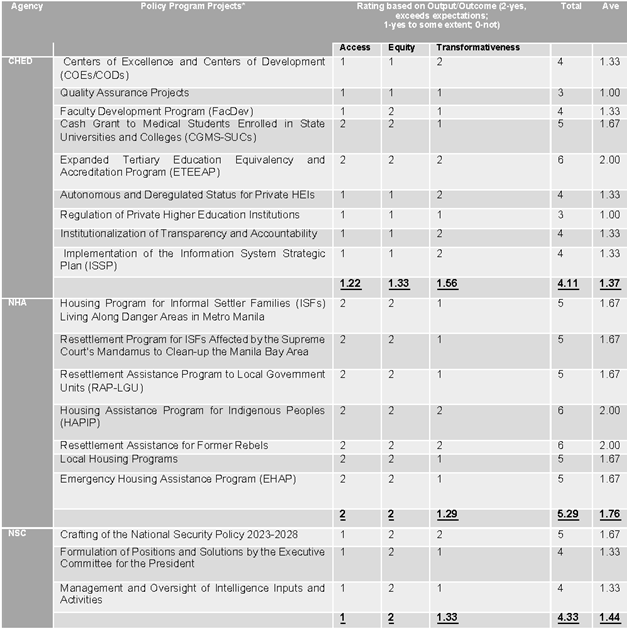
Table 1. Analysis of Agency Initiatives in Addressing Social Inequalities
Notes
- See Annex 1 for details on mandates.
- See Annex 2-A for detailed CHED Functions, Programs and Outcomes.
- See Annex 2-B for detailed NHA Functions, Programs and Outcomes.
- See Annex 2-C for detailed NSC Functions, Programs and Outcomes.
- See Annex 3.
- See Annex 4.
References
Bustamante, C. B. (2017). Higher Education Research in the Philippines: Policies and prospects. Researching Higher Education in Asia, 287–295. https://doi.org/10.1007/978-981-10-4989-7_16
Chao, R. Y. (2022). Higher education in the Philippines. International Handbook on Education in South East Asia, 1–28. https://doi.org/10.1007/978-981-16-8136-3_7-2
CHED. (n.d.). Overview of Philippine Education. iEducation Philippines: International Affairs Service – Commission on Higher Education. https://ieducationphl.ched.gov.ph/overview-of-philippine-education/
Lee, Y. (2021). Government for leaving no one behind: Social Equity in Public Administration and Trust in Government. SAGE Open, 11(3).
https://doi.org/10.1177/21582440211029227
NHA. (n.d.). About – National Housing Authority. National Housing Authority. https://nha.gov.ph/about/
NSC. (n.d.). National Security Council introduction. National Security Council. https://nsc.gov.ph/index.php/transparency/8-transparency/65-nsc-intro
Official Gazette. (n.d.). Publications. https://www.officialgazette.gov.ph/
Official Gazette. (1975). Presidential decree no. 757, S. 1975. Official Gazette. https://www.officialgazette.gov.ph/1975/07/31/presidential-decree-no-757-s-1975/
Official Gazette. (1986). Executive order no. 115, S. 1986. Official Gazette. https://www.officialgazette.gov.ph/1986/12/24/executive-order-no-115-s-1986/
PCHRD. (n.d.). Publications. Philippine Council for Health Research and Development. https://www.pchrd.dost.gov.ph/publications/2022-national-ethical-guidelines/
PNA. (n.d.). Newsroom. Philippine News Agency. https://www.pna.gov.ph/
UNESCWA. (2020, December 18). Toolkit for mainstreaming social justice principles in development policies. United Nations Economic and Social Commission for Western Asia. https://archive.unescwa.org/publications/toolkit-mainstreaming-social-justice-principles-development-policies
Annex 1
Mandates of Key Agencies: CHED, NHA, and NSC
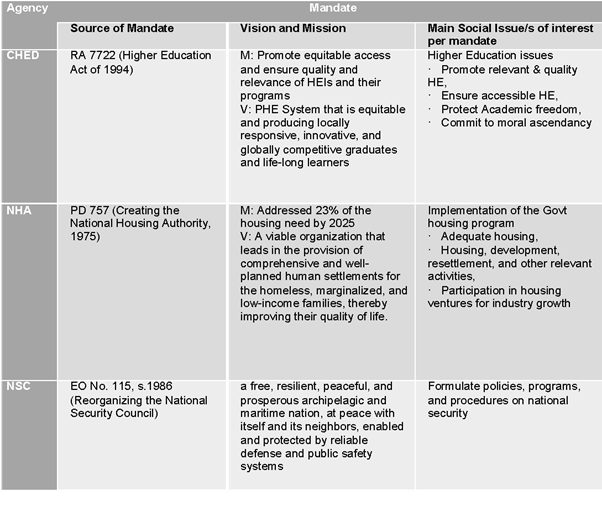
Annex 2-A.
CHED Functions, Programs, and Outcomes
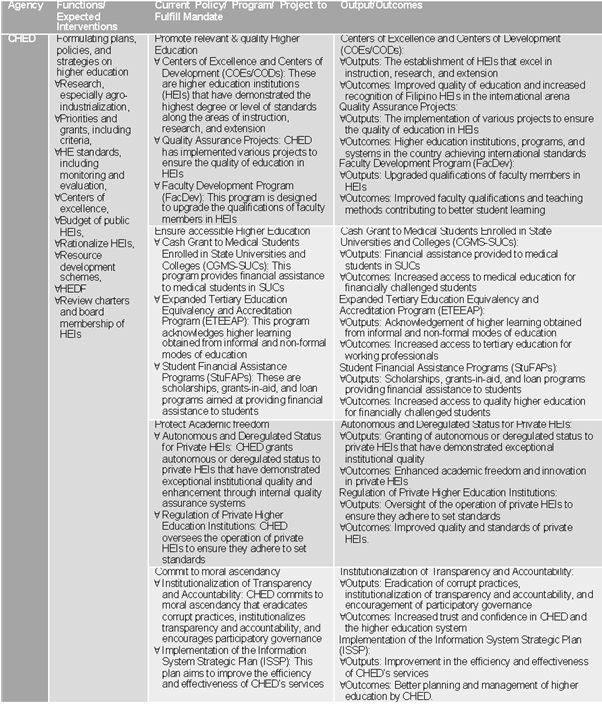
Annex 2-B.
NHA Functions, Programs, and Outcomes
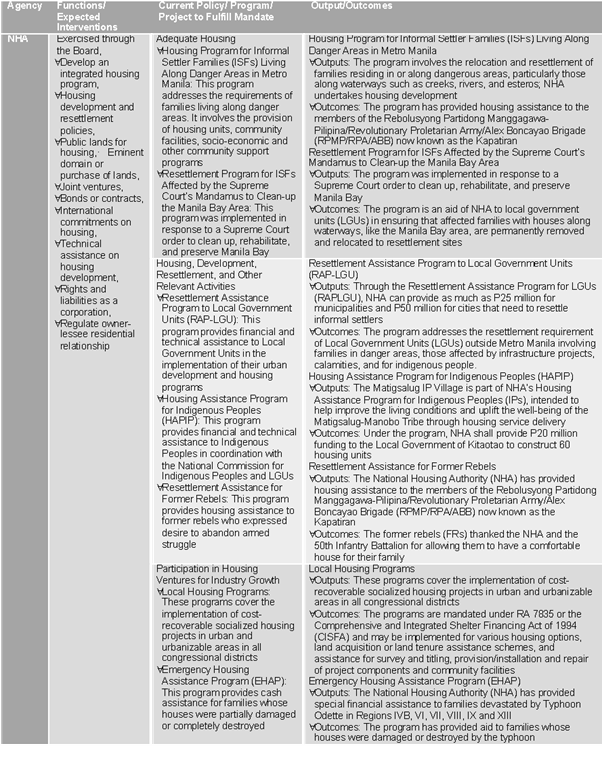
Annex 2-C.
NSC Functions, Programs, and Outcomes
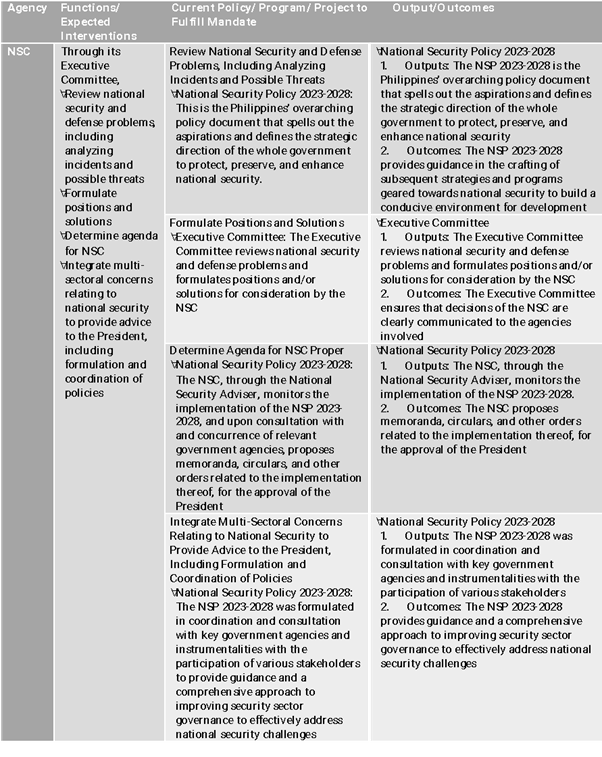
Annex 3.
Summary of PH Context, International Trends, and Analysis
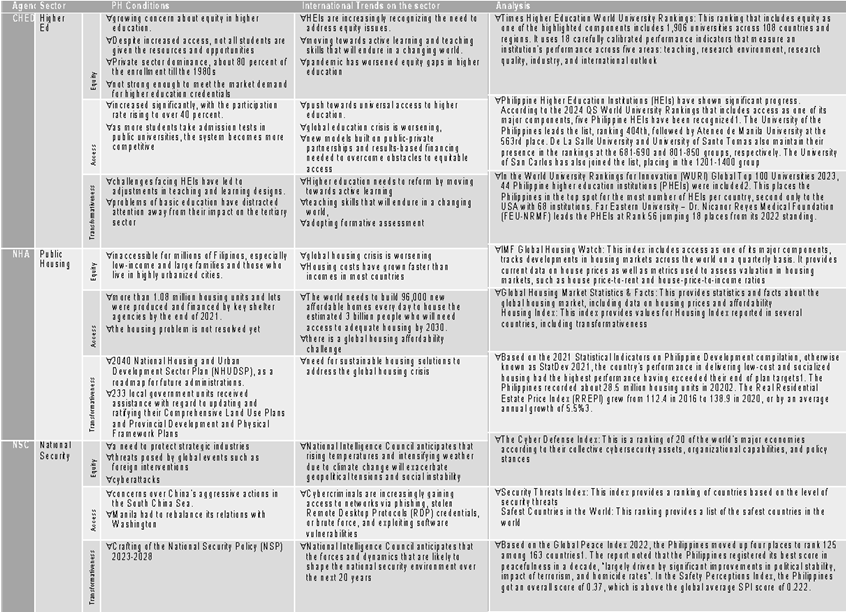
Annex 4.
Summary of Analysis on Weaknesses, Challenges, and Opportunities for Improvement
